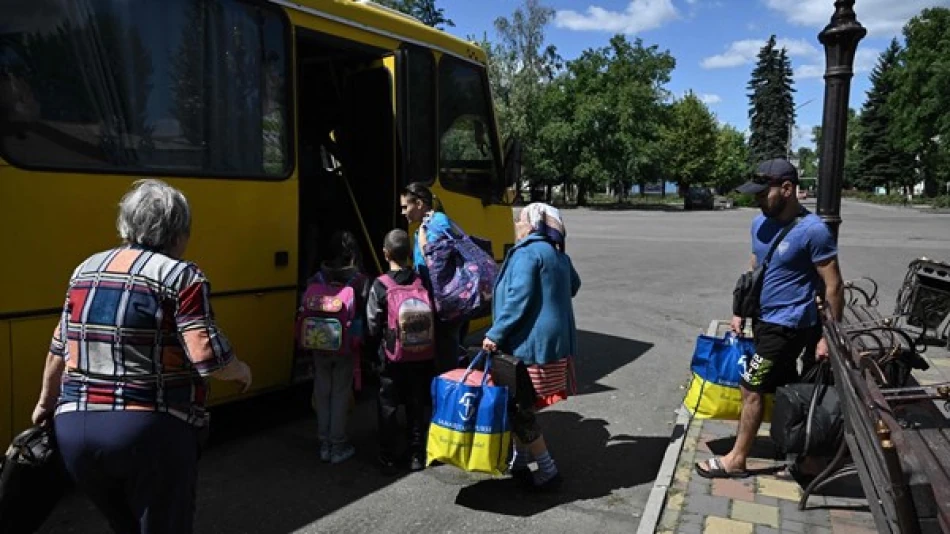
Ukraine Evacuates More Villages as Conflict Intensifies
Ukraine Orders Mass Evacuations as Russian Forces Accelerate Eastern Offensive
Ukrainian authorities have issued urgent evacuation orders for thousands of families in the eastern Donetsk region as Russian forces achieve their most significant territorial gains in months, capturing strategic settlements and advancing up to 10 kilometers along a narrow front. The escalating military pressure comes just days before a high-stakes summit between Russian President Vladimir Putin and U.S. President Donald Trump in Alaska, where Ukraine's future hangs in the balance.
Strategic Retreat Under Fire
Donetsk Governor Vadym Filashkin announced the mandatory evacuation of Druzhkivka, a key town near the breakthrough zone, focusing initially on the 1,879 children living in the area along with four surrounding villages. The evacuation order represents Ukraine's acknowledgment that Russian forces have fundamentally shifted the battlefield dynamics in this critical sector.
Russian forces claimed control over the village of Iskra and the small town of Shcherbynivka on Thursday, building on Tuesday's rapid 10-kilometer penetration near the towns of Dobropillia and Druzhkivka. This represents the most substantial Russian territorial gain since their summer offensive stalled months ago.
Cascading Defensive Collapse
The speed of the Russian advance has caught Ukrainian defenders off-guard, forcing a series of reactive evacuations across the region. Wednesday's evacuation order for Bilozerske, another town near the breakthrough zone, signals that Ukrainian military planners expect the Russian momentum to continue.
The pattern mirrors previous Russian offensives where initial breakthroughs created cascading effects, forcing Ukrainian forces to abandon prepared positions and fall back to secondary defensive lines. The 10-kilometer penetration suggests either a Ukrainian tactical withdrawal or a significant degradation of defensive capabilities in this sector.
Diplomatic Pressure Meets Military Reality
The timing of Russia's offensive push appears deliberately calculated ahead of Friday's Putin-Trump summit in Alaska. The Kremlin has stated the meeting will focus on "resolving the Ukrainian crisis," but Russia's negotiating position has been dramatically strengthened by these battlefield gains.
Historical precedent suggests that territorial control directly translates to diplomatic leverage in conflict resolution talks. Russia's ability to demonstrate continued military momentum undermines any Ukrainian or Western narrative about Russian weakness or stalemate.
Economic and Humanitarian Implications
The forced displacement of nearly 2,000 children and their families adds to Ukraine's mounting refugee crisis, straining already stretched resources and social services. Each evacuation order represents not just immediate humanitarian costs but long-term economic damage as productive regions fall under Russian control or become uninhabitable conflict zones.
For international investors and aid organizations, the accelerating pace of territorial changes complicates long-term planning and reconstruction efforts. The instability also affects regional energy markets, as the Donetsk region contains significant industrial infrastructure and energy assets.
Strategic Implications for Global Order
Russia's renewed offensive capability challenges Western assessments about the conflict's trajectory and raises questions about the effectiveness of ongoing military aid to Ukraine. The breakthrough suggests either successful Russian adaptation to Ukrainian defensive tactics or a significant shift in resource allocation and military capacity.
The Alaska summit's outcome will likely determine whether these territorial gains become permanent fixtures of a negotiated settlement or temporary advantages in a prolonged conflict. For European security architecture and NATO's eastern flank, the precedent being set in eastern Ukraine carries implications far beyond the immediate battlefield.
Most Viewed News

 Layla Al Mansoori
Layla Al Mansoori






